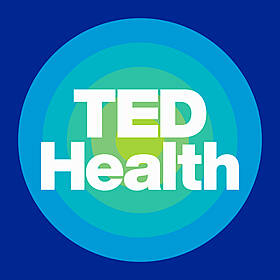
A hospital in the cloud bringing health care anywhere in the world | Mohamed Aburawi
22 April - 6 minsWhat if AI could help connect you with the right medical care, exactly when you need it? Health systems entrepreneur, surgeon and TED Fellow Mohamed Aburawi explores how his digital health platform, Speetar, uses AI to bridge the healthcare gap in underserved regions, like his native Libya, by connecting patients with doctors who truly understand their needs. Hosted on Acast. See acast.com/privacy for more information.

Interview: 3 reasons why medications are so expensive in the US | Kiah Williams
A century after its discovery, insulin remain essential in treating diabetes, and has a relatively low production cost, with a vial generally costing less than $6 to make. But those in the US pay on average 10 times more than those in other countries— leading some patients to take less than prescribed. Kiah Williams takes a look at the US supply chain to explore why medications are so expensive. [Directed by Tolga Yıldız, Serin İnan, Kozmonot Animation Studio, narrated by Christina Greer, music by Tolga Yıldız]. After the talk, Shoshana interviews Dr. Hussain Lalani on his research into improving access to affordable prescription drugs. Hosted on Acast. See acast.com/privacy for more information.
28 mins
29 April Finished

What are those colors you see when you rub your eyes? | Paul CJ Taylor
In the 1600s, Isaac Newton conducted a series of experiments to better understand the lights and colors that sometimes appear when your eyes are closed. If you’ve ever sat around an evening campfire or unintentionally glanced at the Sun, you may have noticed illuminated patterns briefly dance along your vision. So how do these visual illusions form? Paul Taylor explores the science of afterimages. [Directed by Sofia Pashaei, narrated by Alexandra Panzer, music by Cem Misirlioglu, WORKPLAYWORK]. Hosted on Acast. See acast.com/privacy for more information.
7 mins
15 April Finished

Does your heartbeat shape your sense of time? | Irena Arslanova
Do you ever feel like time slows down when you’re bored but flies when you’re having fun? Cognitive neuroscientist Irena Arslanova explores the ways your brain and heart shape your perception of time, revealing how your heartbeat doesn’t just keep you alive — it also influences whether moments feel fleeting or stretched. Hosted on Acast. See acast.com/privacy for more information.
11 mins
8 April Finished

Interview: How do kidney transplants work? | Alexander H. Toledo
In 1954, Joseph Murray attempted a type of kidney swap that no doctor had tried before. The surgery was a success, and the patient would go on to live with the transplanted organ thanks to one key factor: it came from his identical twin. 70 years later, nearly 100,000 kidneys are transplanted annually in the US alone. So how does this surgery work today? Alexander H. Toledo explains the procedure. [Directed by Biljana Labović, narrated by Addison Anderson]. Extended content: After the talk, Shoshana speaks with Leilani Graham, a writer and healthcare consultant, who survived four cardiac arrests and then a heart transplant about her personal trials and the realm of organ transplants. Hosted on Acast. See acast.com/privacy for more information.
23 mins
1 April Finished

Your relationship expectations could be holding you back | Stephanie R. Yates-Anyabwile
What if the secret to a happy relationship isn’t following the rules, but rewriting them? In this refreshing talk, couples therapist Stephanie R. Yates-Anyabwile explores why letting go of traditional societal expectations of romantic relationships — like sharing the same routines or even, in some cases, living together — can help couples embrace their individuality, reduce conflict and build stronger, more fulfilling connections. Hosted on Acast. See acast.com/privacy for more information.
10 mins
25 March Finished





















